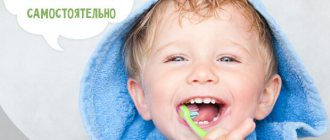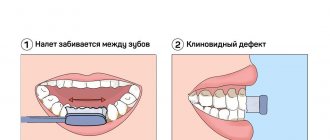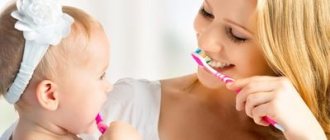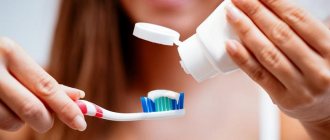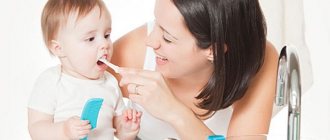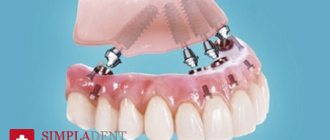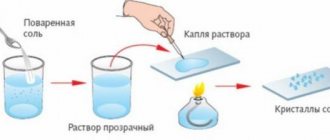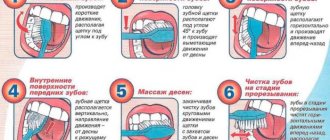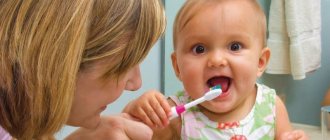In dentistry, as in any human activity, there are a number of controversial issues and unresolved issues. For example, how many times should you brush your teeth a day? At one time we were taught that brushing 3 times a day is the norm, then we agreed that too frequent grinding of teeth leads to abrasion of the protective enamel, which is fraught with dental problems, and we began to be taught to brush our teeth exclusively in the morning and evening.
So the second controversial question arose: is it better to brush your teeth before breakfast or after breakfast ? Naturally, there are no questions about brushing your teeth in the evening: before bed, after dinner - brushing your teeth will be most effective. But how to brush your teeth in the morning: before and after breakfast? When will this procedure be most effective?
Why should you brush your teeth?
The oral cavity, in which the teeth are actually located, is the most infected of all cavities of the human body, and insufficient care for it can lead to dire consequences. Leftover food under the influence of bacteria will be subject to decay, rotting and fermentation. In addition, soft plaque will release acid, which destroys the enamel, resulting in the formation of caries. All this harms not only the teeth, but can also provoke diseases of the internal organs, reduce the body’s defenses and become a source of bad breath.
Do you need to brush your teeth? Of course, it's up to you to decide. Even ancient people, not knowing about the danger of caries, tried to clean their teeth after eating with the help of homemade toothpicks in the form of grass stems and chewed sticks. Unfortunately, throughout the existence of mankind, it has not been possible to teach everyone to take care of their oral cavity. It is still not uncommon to find “instances” who believe that brushing your teeth is a completely useless activity. For example, in China, half of the rural population has never even held a toothbrush in their hands. It is clear that the price for such negligence is the loss of teeth, and a toothless person has never been a role model in developed societies.
Brushing your teeth before breakfast
- The amount of saliva secreted during sleep is much less than during the day. Therefore, overnight the acidity in the mouth increases, microorganisms multiply and accumulate more actively. If you have breakfast with unbrushed teeth, harmful microbes can enter the esophagus and stomach.
- Due to unpleasant sensations in the oral cavity in the morning, you always want to thoroughly brush your teeth and freshen your breath before eating.
- Toothpastes and powders contain fluoride-containing substances that protect tooth enamel from the effects of fruit and other acids contained in foods included in the breakfast menu. If your teeth are brushed before breakfast, it means they will no longer be subject to the destructive influence of external factors.
How to brush your teeth correctly?
Improper brushing of teeth is a phenomenon whose scale is enormous. Almost all of us do not know how to brush our teeth the way we should. Despite the apparent simplicity of the process, there are a lot of “nominal” methods of brushing teeth in the world. All of them differ in the nature of movements, sequence and position of the brush relative to the teeth or gums. For example, the famous dentist Reite suggested placing the toothbrush at an angle of 90 degrees, and Stillman distinguished himself by recommending that when brushing your teeth, press as hard as possible on the gums. Fortunately, modern dentists have taken only the best from the works of their colleagues and reduced it to a few general rules on how to brush your teeth:
- The cleaning itself should last at least 3 minutes;
- The brush should be held at an angle of 45 degrees relative to the teeth and gums;
- In order not to spread germs throughout the oral cavity, it is recommended to divide the procedure into two parts: first brush the lower dentition, and then the upper one;
- You should start with the front teeth, gradually moving to the back teeth;
- The lower teeth are brushed from bottom to top, and the upper teeth from top to bottom;
- The chewing surface of the teeth is processed in a circular motion;
- After rinsing your mouth, don't forget to clean your tongue, where a lot of germs also accumulate. Remember that the tongue is covered with plaque, which is the same breeding ground for microbes as deposits on the teeth;
- At the end of the procedure, it is recommended to use mouth rinses;
It is recommended to brush your teeth twice a day: after breakfast and dinner. This is a classic of oral hygiene. But it’s no secret that the habit of carrying out hygiene procedures before the morning meal is not so uncommon. Many older people are accustomed to brushing their teeth in the morning before eating. They will have to do this after breakfast, or change their habit. Since no one can brush their teeth in a dream, in the evening brushing is done after dinner or the last meal. Of course, ideally you should brush your teeth even after lunch, but this is not always possible. You can get out of the situation by simply rinsing your mouth or chewing gum for 10 minutes, but no longer!
How to find a compromise
While doctors are arguing: when you need to brush your teeth - before breakfast or after, it is better to choose the rational grain from both options and put it into practice.
- Brush your teeth both before and after eating. This option is suitable only for the lucky owners of strong, healthy teeth with good enamel. If you are unsure about your teeth, it is better to consult a dentist.
- Brush your teeth no later than half an hour before eating, and immediately before sitting down at the table, rinse your mouth with plain clean water.
- In the morning, instead of brushing your teeth, use a decoction of medicinal herbs or a ready-made balm for rinsing.
It is necessary to remove the plaque that has formed on the tongue overnight. Attention! Green tea is a good natural antimicrobial agent. You can drink a cup of it before meals and several times during the day. - Properly selected, high-quality, modern antibacterial toothpaste helps protect teeth for 12-24 hours from exposure to harmful environments, microorganisms, and acids.
Brushing your teeth both before and after eating – this issue gives rise to a lot of controversy.
The optimal solution is to brush your teeth in the morning before breakfast, and after breakfast, rinse your mouth with water or a salt solution. Whatever option is chosen from the two proposed, the main goal is to keep teeth healthy for many years. The quality of chewing and assimilation of food, and therefore the health of internal organs, depends on their condition. Everything else depends on the individual preferences and desires of the person.
I brush my teeth with this brush
A good toothbrush plays a key role in maintaining oral hygiene. So you need to choose it carefully. The first thing you should focus on is the degree of rigidity. Those who are confident in the strength of their gums can use. Their rigidity provides the most powerful cleansing of plaque. But it should be preferred if you are predisposed to bleeding gums, so as not to further injure them. If this problem bothers you greatly, then you should think about starting treatment for gingivitis. But the most versatile brushes to use are medium-hard brushes. They suit most people. Remember that the cleaning head of the toothbrush should not be large, otherwise its effectiveness will be reduced.
When choosing between a regular brush and an electric one, know that experts have not proven which one will be healthier for your teeth. The definite advantage of an electric brush is that it is easier to use and also more convenient for the elderly and children. Otherwise, its benefits depend on how you manage it. An ultrasonic brush is considered the most effective. It usually has several ultrasound frequencies, which allows it to kill bacteria not only on the surface, but also at a depth of 5 mm under the gum. This will be a good addition to a set of measures for the treatment of periodontitis. Any, even the best toothbrush should be changed every 3-4 months.
What is an irrigator
A device for removing plaque and food debris from the oral cavity using a stream of water under pressure. It is also used for gum massage. Tap water is not advisable for use in an irrigator. It should be boiled or well cleaned, at room temperature. Irrigators come in different models, portable and stationary. Irrigator operating modes:
- jet - under strong pressure of water, pieces of food are washed away;
- shower - lower pressure removes small particles;
- gum hydromassage mode.
Portable models are powered by a rechargeable battery, stationary models are powered by an electrical outlet with a set of individual attachments for several people. The irrigator does not replace daily brushing of teeth; it is recommended for use 2-3 times a week. Well suited for those who have dental crowns and bridges installed. Before using the device, people with cardiovascular diseases need to consult a doctor.
An irrigator is a modern device for maintaining oral hygiene at an extremely high level, which is preferably used after brushing your teeth with a toothbrush. Its action is to supply a thin stream of liquid under pressure into the interdental spaces, under fixed dentures.
Which toothpaste should I use to brush my teeth?
The main purpose of toothpastes is to enhance the cleaning effect of the mechanical action of a toothbrush on the teeth. Therefore, they are based on foaming agents and abrasives. However, toothpastes not only help cleanse the surface of the teeth, but also have a preventive and therapeutic effect, for which active substances are added to them. Many people wonder which toothpaste is best for brushing their teeth. The answer is simple - the one that suits you best.
When choosing a paste, you need to focus on the problems that bother you. For example, people with sensitive teeth may benefit from non-abrasive toothpastes containing potassium chloride or strontium chloride. For those who have gum problems, toothpastes with anti-inflammatory and antibacterial effects are recommended. For the general prevention of caries and periodontal diseases, each of us should brush our teeth with toothpastes containing fluoride. But you shouldn't use them all the time. Pastes with fluoride should be alternated with pastes without it, which will also be useful for people with fluorosis (dental disease caused by an excess of fluoride in drinking water).
Important point! For complete teeth cleaning, just a 5 mm strip of toothpaste is enough.
Folk remedies for oral hygiene
Folk remedies for oral hygiene should be used with caution so as not to cause mechanical damage to tooth enamel or damage the gums. This especially applies to the recommendation to brush your teeth with soda or salt instead of toothpaste.
Attention! Traditional medicine for toothache recommends a decoction of sage, yarrow, and oak bark. Oak bark helps well with incipient periodontitis and gingivitis.
To eliminate bad breath - halitosis, it is recommended:
- rinse your mouth with 3% hydrogen peroxide several times a day;
- Dissolve a few drops of alcohol infusion of horseradish juice (root) in a glass of warm boiled water and use for rinsing;
- for the same purpose, use a decoction of herbs - mint, oregano, St. John's wort in a ratio of 4: 2: 2, 3 tablespoons per 0.3 liters of boiling water, leave;
- infusion of wormwood and St. John's wort;
- infusion with celery root in vodka – 1 tsp. per glass of water;
- 1 tsp salt for 2 tbsp. vegetable oil for rinsing;
- eat fried sunflower seeds;
- finish your meal with ground ginger - 0.5 tsp.
A natural antiseptic, parsley, helps relieve pain from stomatitis. You need to chew the leaf or rinse your mouth with its juice. Effective anti-inflammatory agents are decoctions of chamomile, calendula flowers, linden, and plantain leaves. Their use also helps heal wounds and mouth ulcers. It is good to massage the gums using fir, sea buckthorn, olive oils, and tea tree oil. Horseradish and celandine juice in decoctions and infusions should be used carefully, in small quantities.
Why is this necessary?
There are several main tasks that are assigned to teeth, or rather, to healthy teeth. Therefore, brushing your teeth is an integral part of any person’s life. Let's look at each reason why you need to brush your teeth daily and, most importantly, correctly.
Why brush your teeth
Chewing food
Proper placement of teeth and their good health not only beautify a person's appearance, but also serve other purposes. In the human digestive tract, the mouth plays the role of the first mechanism. When chewing, food is crushed and soaked in saliva, making its further digestion in the intestines and stomach much easier. If the food you eat is not sufficiently saturated with saliva, this will certainly negatively affect its digestibility. Only those people whose mouths are decorated with healthy and strong teeth can perform thorough processing of the food they eat.
Moreover, food and brushing teeth
Clarity of diction
It is no secret that not only the tongue and lips, but also the teeth are involved in the formation of sounds during conversation. A thinned dentition will not allow a person to speak clearly. Diction can also be negatively affected by improper development of teeth. Even if a person loses only one front tooth, he will eventually develop a lisp. If this happened at a young age, then children may stop communicating with a child who has a lisp. As a result, the child will gradually move away from society and become more withdrawn.
Teeth cleaning
Dental health
Many dental diseases, such as tooth decay, are much easier to prevent than to cure. The same applies to improper tooth growth in children. It is enough just to follow preventive measures and observe the rules of oral hygiene. Ignoring such measures will lead to serious complications, the treatment of which will certainly take much more time and money.
On a note! Dentists note that it is unacceptable for a patient to live with bad teeth, since bacteria in the mouth can easily spread to internal organs. As a result, ignoring a diseased tooth can result in a serious disease of the entire body.
Healthy teeth
